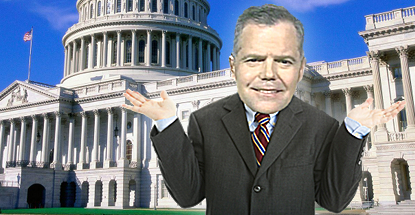 The CEO of casino operator MGM Resorts says it’s no sweat off his back if US federal politicians succeed in passing anti-online gambling legislation.
The CEO of casino operator MGM Resorts says it’s no sweat off his back if US federal politicians succeed in passing anti-online gambling legislation.
In an hour-long interview with reporters on Wednesday, MGM CEO Jim Murren (pictured) said his company was ‘in the resort-based business, we are not in the convenience gambling business.” Murren said people come to MGM properties to enjoy “a form of hospitality and entertainment they cannot get at home and they certainly can’t get on the internet … Getting the growth of internet gaming in and of itself is not required for us to meet our growth projections.”
The US House of Representatives is currently mulling the Restoration of America’s Wire Act (RAWA), which would ban all forms of online gambling, except horseracing, fantasy sports and on-premise mobile casino apps. (State lotteries are pressing for their own exemption.) Sen. Lindsey Graham (R-SC), who is mulling a run for president, has promised to introduce his own version of the bill to satisfy GOP sugar daddy and RAWA supporter/author Sheldon Adelson.
Should RAWA pass, MGM would not go unscathed MGM co-owns Atlantic City’s Borgata Resort Casino, which has teamed with Bwin.party (and Pala Interactive) to become New Jersey’s online gambling market leader. RAWA wouldn’t affect MGM’a highly successful social casino app myVegas, which operates in partnership with Andrew Pascal’s PlayStudios.
Murren said the US gaming industry “has much to blame for the lack of success” of pro-online federal legislation. Referring to the failed 2012 effort by Sen. Harry Reid, Murren said the industry “could not agree as to what day it was,” let alone reach consensus on comprehensive online gambling legislation. So a plague on all our houses.
Murren was in full ‘everything must go’ mode on Wednesday, saying he also wouldn’t lament if New Jersey’s ongoing legal quest ended Nevada’s monopoly on single-game sports betting. Murren said the prospect of nation-wide betting might bother some other Vegas casino bosses but “I’m not one of them, and [MGM] are the largest one there.”
This laissez-faire attitude doesn’t extend towards daily fantasy sports (DFS) betting, which Murren insisted “is gambling.” Anyone who thinks differently is “absolutely, utterly wrong.” Murren said MGM hadn’t entered the DFS market “because we haven’t gotten comfort by our regulators that we should.” Murren, who is also chairman of the American Gaming Association, said the industry group was still wrestling with whether or how to involve its members in DFS.
Murren expressed optimism that the nearly year-long slump in Macau’s gaming revenue had to end sometime but Murren can afford to be optimistic. Unlike the two other US casino companies doing business in Macau, MGM earns the majority of its money stateside. Domestic properties accounted for over two-thirds of MGM’s overall revenue in 2014, hitting a peak not seen since before the 2008 recession. MGM reports its Q1 figures on Monday.
UPDATE: Clearly not anticipating how his RAWA comments would be interpreted, Murren gave a followup on Friday to Nevada journalist Jon Ralston. Murren said just because MGM would “continue to thrive without online gaming doesn’t mean that we don’t wholeheartedly oppose a ban. We do. … A federal ban won’t stop online gaming – it will only prevent licensed, legitimate operators from providing consumers with safe and secure games that include protections against underage gambling.”
